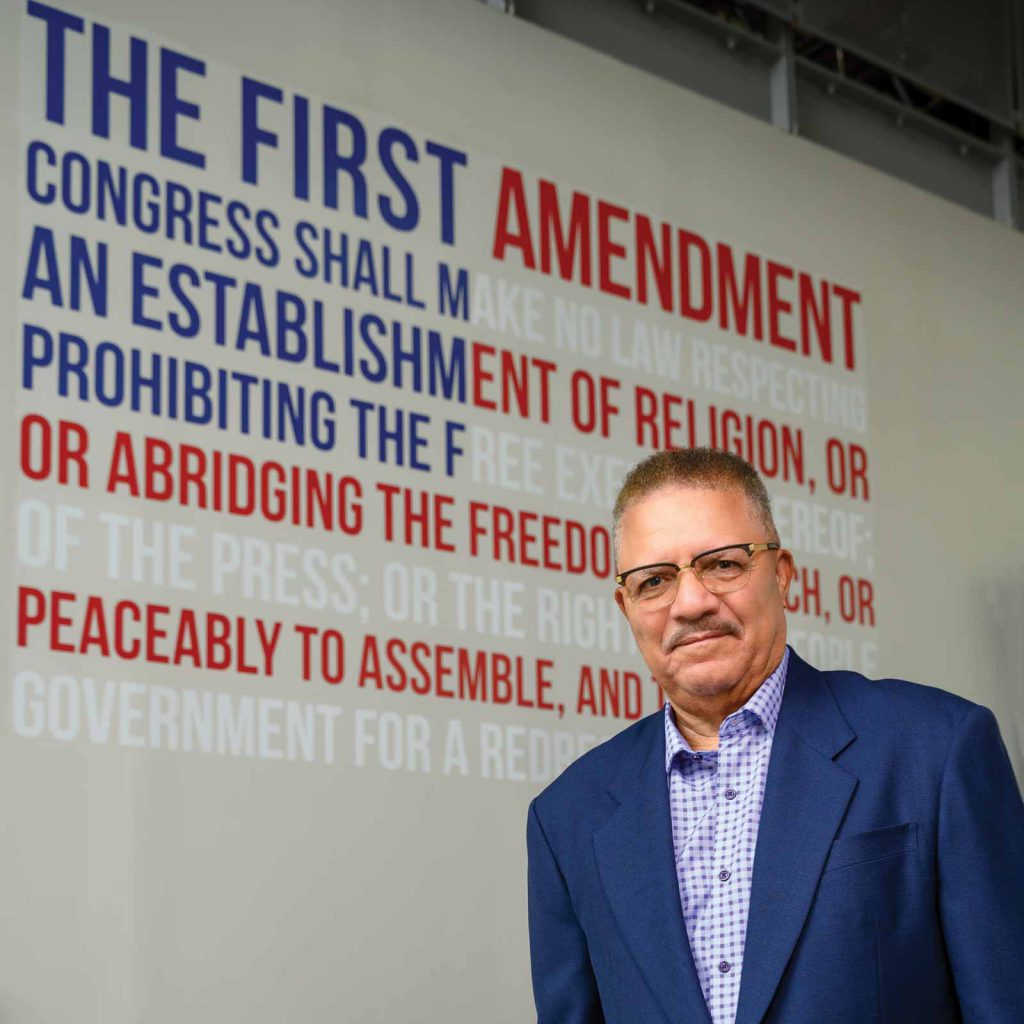BY JOCELYN SLAUGHTER

BIO
DeWayne Wickham, M.P.A. ’82, had to work harder than most to suss out his own identity. He lost both parents at the tender age of 8 to a tragic murder-suicide that left him orphaned, vulnerable and always asking the question: “Who am I?” Despite his childhood trauma, this native son of Baltimore learned the value of hard work from his aunt and the value of networking on the golf course. He harnessed those parts of his identity, along with his intrinsic curiosity, and pushed himself toward a successful career in journalism that has spanned over four decades.
Even before his parents passed away, a young Wickham would walk to Baltimore’s Enoch Pratt Free Library after school. There, the reading hour “infused [his] curiosity” and allowed him to travel to distant places. An avid reader from an early age, he “always had a book with [him],” even as a teenager, when he was likely to be found cutting class in favor of picking up caddying assignments at the local golf course.
Following many of his friends at the time, he eschewed school completely to enlist in the military during the Vietnam War. Wickham spent four years on active duty in the United States Air Force. His service began as a military photographer and he later became a combat photographer—a role which afforded him his first opportunity to engage with civilian and military journalists.
“There are a lot of roads to the top. But for me journalism was one that lifted me out of the life that I found myself in.”
DeWAYNE WICKHAM
Upon his return to civilian life, he took advantage of his GI Bill benefits and enrolled at Baltimore City Community College. When he decided to enroll in the University of Maryland, College Park (UMCP) to obtain his bachelor’s degree, all of his credits would transfer to only two programs—business or journalism. His experience during the war quickly led him to choose journalism; in turn, his experience at UMCP (both his coursework and his role as a reporter and state editor for The Diamondback) led him to become practically obsessed with the subject and, above all, the storytelling.
Almost as much as the story, the concept of being the person who decides which stories need to be—and are—told intrigued Wickham. He was also drawn to the powerful force that the press represents in society, noting that our other democratic freedoms, such as freedom of religion or speech, couldn’t last without it. According to him, “In a democratic society, journalism is the straw that stirs the drink. We need to make sure that everyone has a straw.”
After graduating from UMCP, Wickham stayed as active as possible, notching a few years on his belt at U.S. News & World Report and The Baltimore Sun and as a founding member of the National Association of Black Journalists. (He would later serve as president from 1987 to 1989.) It was in those early years that Wickham marked just how much conversation in print and broadcast journalism was rooted in public policy. As someone who was deeply invested in the history of journalism, Wickham understood that “journalism wasn’t a neutral arbiter, but was a voice that had persuasion.” So, he decided to pursue a Master in Public Administration degree at The University of Baltimore, because, as he put it, “if you want to write about something, you need to know something.”
Now equipped with knowledge and insight to match his passion and curiosity, Wickham launched into a long and storied career. His career led him from Baltimore’s historic Provident Hospital, where he was born alongside most Black Baltimoreans of his generation, to Selma, Alabama, onboard Air Force One with former President Barack Obama, for the 50th anniversary of the march for voting rights. It sat him across from some of the world’s most influential leaders, including Nelson Mandela and Fidel Castro. And it made him a household name as a nationally syndicated columnist for USA TODAY, and over 130 daily newspapers, from 1985 to 2015.
Over those 30 years, Wickham noticed a recurring theme when he conversed with his peers—the next generation of journalists.
As he noticed curiosity waning amongst these up-and-comers—combined with what he saw as the need for “more reporting, less repeating,”—he turned his focus toward education.
He began the transition from practitioner to educator as the Distinguished Professor of Journalism at Delaware State University in 2001. Harkening back to his youth, the next chapters in his career opened up on golf courses and led to teaching opportunities at North Carolina A&T University, University of Pennsylvania, and as the founding dean—now dean emeritus—and professor of journalism at the School of Global Journalism & Communication at Morgan State University in 2013. “The golf course was my friend,” joked Wickham.
Wickham believes “the job of journalists is to tell people what those in authority don’t want them to know,” and peel away the proverbial onion by always asking questions. He’s been very successful in this regard, as well as creating a safe space for journalists—Black journalists in particular—through his leadership. His extensive career has helped him find his purpose and his identity. There is no doubt that his career will also have a lasting impact on future journalists in similar ways, so long as they remain curious.
Watch DeWayne Wickham’s latest documentary below. History of a National Treasure is a dramatic recounting of the people, places and events that shaped one of America’s oldest—and most prestigious—HBCUs, Morgan State University.
Jocelyn Slaughter is a business educator and writer with extensive executive nonprofit experience.
